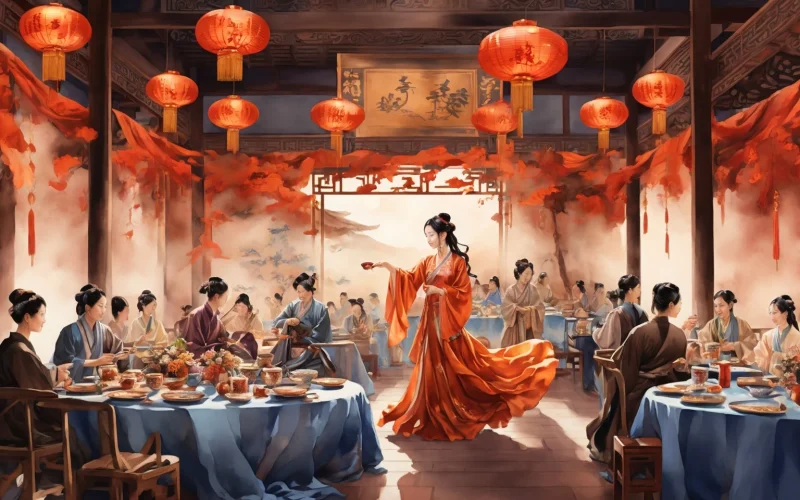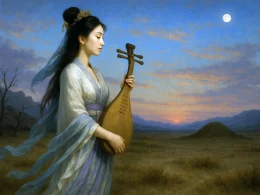Gone are all my past woes! What more have I to say?
My body and my mind enjoy their fill today.
Successful, faster runs my horse in vernal breeze;
I've seen within one day all flowers on the trees.
Original Poem:
「登科后」
孟郊
昔日龌龊不足夸,今朝放荡思无涯。
春风得意马蹄疾,一日看尽长安花。
Interpretation:
Meng Jiao struggled in his official career for a long time, only passing the imperial examination at the age of 46. His joy and relief were beyond words, and this poem vividly captures his exhilaration upon achieving success. In just four lines, the poem radiates the liberation and delight of breaking free from hardship, making it a timeless masterpiece.
First Couplet: “昔日龌龊不足夸,今朝放荡思无涯。”
“The hardships of the past are not worth mentioning; now that I have succeeded, my joy knows no bounds.”
The poet opens with a contrast, briefly acknowledging his past struggles with an air of dismissal, signaling his determination to leave behind those bitter days. The second half of the couplet then magnifies his present sense of liberation and exuberance, showcasing the overwhelming joy of finally achieving success.
Second Couplet: “春风得意马蹄疾,一日看尽长安花。”
“The spring breeze brings triumphant joy, as I ride swiftly, eager to take in all the blooming flowers of Chang’an in a single day.”
The phrase “spring breeze triumphant” merges the poet’s joy with the arrival of spring, vividly expressing his lightheartedness and satisfaction upon success. The image of “swift galloping hooves” suggests his eagerness and excitement, as if he cannot wait to take in all the splendor of the capital. The line “to see all the flowers of Chang’an in a single day” is not only an exaggerated expression but also a reflection of his boundless elation and unrestrained enthusiasm. This famous verse later gave rise to the idioms chun feng de yi (to bask in the joy of success) and zou ma guan hua (to take a cursory glance), cementing its place in literary history.
Writing Features:
- Sharp Contrast: The first couplet contrasts “past hardships” and “present triumph,” emphasizing the dramatic shift in life circumstances and enhancing the poem’s expressive power.
- Vivid Imagery: The use of “spring breeze,” “galloping horse,” and “Chang’an flowers” creates a lively atmosphere, amplifying the poet’s joy.
- Crisp and Rhythmic Language: The poem is short yet powerful, rich in emotion, and flows smoothly, making it highly memorable.
Overall Appreciation:
This poem directly expresses the poet’s ecstatic joy upon passing the imperial examination. Having previously failed twice and endured hardship, he now relishes his triumph, galloping through Chang’an and savoring the beauty of spring—a true reflection of the saying, “When good fortune comes, one’s spirit soars.” In just four concise lines, the poem paints a vivid image of an exuberant and high-spirited scholar, capturing not only personal emotions but also the collective joy of ancient scholars who achieved success in the imperial examination. It brims with a strong sense of life and emotional appeal.
Insights:
This poem not only showcases the exhilaration of scholars who succeeded in the imperial examination but also reflects the ups and downs of life. It reminds us that hardships are temporary and that moments of despair should not be feared; perseverance is key to awaiting one’s moment of triumph. Additionally, the poem’s uninhibited expression of joy serves as a reminder that when success arrives, one should embrace it fully and appreciate the beauty of life.
Poem translator:
Xu Yuan-chong (许渊冲)
About the Poet:
Meng Jiao (孟郊) was born in 751 - 814 AD, a native of Deqing, Zhejiang Province. Meng Jiao's poems include more than 400 poems, most of which are about personal sorrows and loneliness, expressing cynicism, while some of them expose the social phenomenon of disparity between the rich and the poor, and sympathize with the people's suffering.












